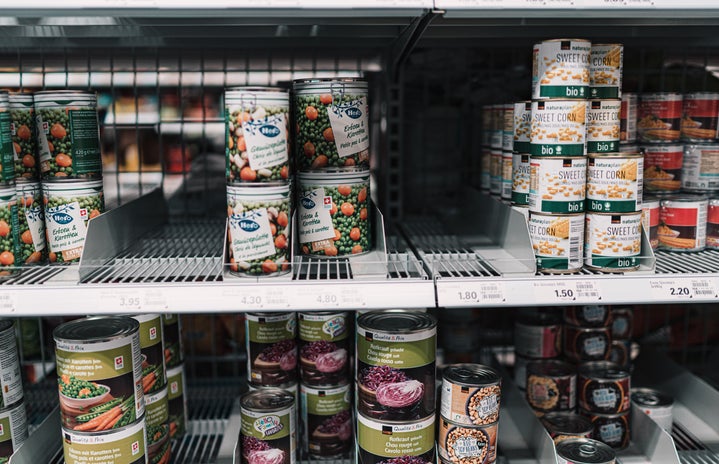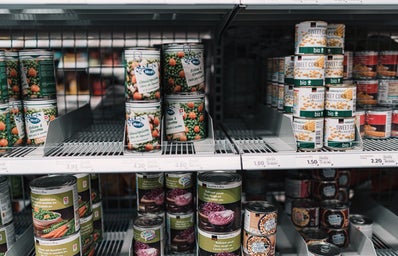I recently had the pleasure of interviewing Nathanya Laurent, the Development Manager at Leeds South and East Foodbank. I was keen to understand the experiences of those who have been tirelessly working to keep important services like this going at a time of such immense insecurity and hardship. What’s more, throughout this festive period, as many will tuck into full plates of home cooked dinners, we must consider those who continue to struggle with food insecurity and destitution. Food banks are set to be busier than ever this winter. By coming together and donating, maybe you could help to shape a better Christmas for families across the country?
The Leeds South and East food bank is affiliated with the Trussell Trust, a nationwide network which provides emergency food and support to those in poverty. A recent national survey estimated that the impact of the COVID-19 outbreak has resulted in quadrupling levels of demand for emergency food relief. Growing rates of unemployment, amid economic uncertainty, has resulted in increasing demand on these important services. This year, just between the months of April to September, over 1.2 million food parcels had already been administered across the country to those in crisis. Just to give you a better idea of the scale of this issue, that is over one and a half times the population of Leeds.
So, I now turn to Nathanya, in order to better understand the issue of food insecurity in the city of Leeds. Firstly, we discussed her experience of working for Leeds South and East food bank over the past few months.
Nathanya: ‘We have been working together as a team to provide a robust service for our clients and have definitely noticed an increase in the need for emergency food relief. This has shown us that people need support more than ever. For many, circumstances have changed and they are really struggling to get by. We are a small team running a large operation. As well as the increased demand for our service, there has also been increased pressure on our staff and volunteers. We have faced many challenges as a team, in terms of how to even survive and continue functioning. Yet we’re still here and we’re still smiling.’
I was also keen to understand how the team have adapted the ways in which they operate and how Nathanya personally found these adjustments.
Nathaya: ‘When we entered the first national lockdown, we really had to rethink the way in which our organisation would work. We also had a lot of volunteers who were vulnerable or shielding. We lost the capacity to open all the food banks and to do so safely across the city. During lockdown and beyond, we ran a delivery service across the South and East of Leeds so that we could continue to support those in need. However, this is a vast area and we were constantly having to think creatively and work out how so few of us could manage such a large operation. We are required to continually adapt to changing circumstances. A lot of face to face and paper based voucher systems had to quickly be moved online. Some clients don’t actually have access to phones or the internet, so at times it was hard to reach people in need. We have now safely re-opened our food banks and so far so good!’
But what about the second lockdown and subsequent stricter tiered restrictions?
Nathanya: ‘Luckily, throughout the second lockdown we were okay. As a charity, we were able to safely keep the service open. As we are considered an essential service we haven’t been affected by subsequent restrictions’.
I also wanted to know more about what a typical food parcel includes and on average how many do Leeds South and East food bank administer a day?
Nathanya: ‘The food parcels were designed by the Trussell Trust many years ago. They worked closely alongside a nutritionist to plan a robust package. Each individual or family can receive a three day emergency food parcel which includes three meals for each family member. The list involves lots of cupboard foods which can also be stored for longer. We also work with other organisations who kindly provide fresh food on occasion, this can be a real treat for clients as they can receive fresh fruit, vegetables and meat. We also feel that everyone deserves a treat, especially at Christmas time, so we try to put a few nice bits in when we can. In terms of how many we administer, on a daily basis we feed 60 people and that includes many children.’
Over the past few months, have you noted a particularly sharp rise in demand for your services at any certain time?
Nathanya: ‘Having recently reviewed the data with a colleague, I’d say that the biggest increase happened when the pandemic first hit in March. Due to school closures there was a particular increase in families using the service. Already difficult circumstances were made harder and everyone was panicking. Suddenly free school meals were out of the question and whilst schools and other services were trying to work out what to do, we stepped in to support these families. We were overwhelmed, supporting many vulnerable members of the community.’
I recently read an interesting piece which was published on the Trussell Trust website that stated ‘around half of the people who have used a food bank during the pandemic, had never used one before’. Nathanya, have you noticed any particularly ‘at risk’ groups who have had a greater need for your services during this time?
Nathanya: ‘I would say that even before the pandemic we were seeing a shift in our client base. Traditionally, the food bank has supported clients who are in receipt of benefits or waiting on benefits due to universal credit delays as well as those on disability benefits. We are now seeing a trend in which people who are on low-income, zero hour contracts or have been made redundant are needing our support. Often, people are having to make the choice between paying a bill or eating a meal. Where we step in, is when someone is really struggling with their finances.’
Sadly, Nathanya and her colleagues also noticed an increase in the number of domestic abuse victims relying on their services during this time.
Nathanya: ‘We have also seen an increase in people who have experienced domestic violence and have been forced to escape dangerous situations. We have longstanding relationships with many other charities who often refer these individuals to our services. Many who have been placed in temporary accommodation or emergency shelters, then need to rely on us for food. We work closely with the West Yorkshire Police and Refuge to support survivors of violence.’
During the holiday season people can be very generous and often choose to support charities like the Trussell Trust. Are you at all concerned that given the current context of the pandemic, people may be less generous with donations this year?
Nathanya: ‘We have seen a dip in donations since the pandemic hit. However, there has still been a real generosity of spirit. For those who can donate we have seen really generous amounts of food and funds being given. Of course we need both, as money is needed to pay rent on the warehouse where food is stored and for petrol as the vans are still being used to deliver food. People have definitely tightened their belts as we experience this recession. However when we have put out appeals, we’ve had many individuals and organisations coming forward to help. People realise how important the work we do is. We are not too worried about the dip and we really appreciate those who have been so kind. If we can just keep going and get people’s basic needs met then they will be in a stronger position to face the world.’
Finally, could you please explain a bit about the difference that donations can make and why we should be encouraging people to donate during the festive period and beyond?
Nathanya: ‘I like to tell some of the stories about clients who have come our way. This client’s exact words to me were “if we weren’t in the middle of a pandemic, I’d give you the biggest hug”. This gentleman said that he hadn’t got out of bed because he was too hungry. He was also concerned that when he was up and about it meant that he had to face the fact that he was so hungry. By donating both food and funds, this means we can help more clients like this gentlemen. One of our volunteers also recently told us about taking a food parcel to a family and the children were tucking into the chocolate bars we put in before the mum had even had a chance to finish saying thank you. They were so excited.’
‘With the recession and ongoing issues due to the pandemic, donations mean that we can continue to work hard for these people and make sure that vulnerable people have food in their bellies. The practical donation of food means we can feed people and money means that we can pay volunteers who need money for petrol, and for staff like myself as well. I’m paid part-time, but I’m working day in day out to support people.’
‘It’s fantastic supporters and students like yourself who can help us with what we are doing. Raising awareness is really important. There are also lots of students who need our support, know that you are supporting fellow students too.’
The Trussell Trust are also currently running their own festive fundraising initiative called ‘Not Your Christmas Party’. The idea being that you can do your bit with a new kind of ‘virtual Christmas do’ (very 2020 if you ask me). This is an opportunity to get your friends and family together via zoom and donate the money you would normally spend on a Christmas party to families who really need food this holiday season. It is free to register and a great cause!
Huge thanks to Nathanya Laurent, the Development Manager at Leeds South and East food bank, for taking the time to answer my questions.
https://notyourchristmasparty.trusselltrust.org
https://www.trusselltrust.org/about/
Words By: Olivia Snelson
Edited By: Dasha Pitts-Yushchenko



